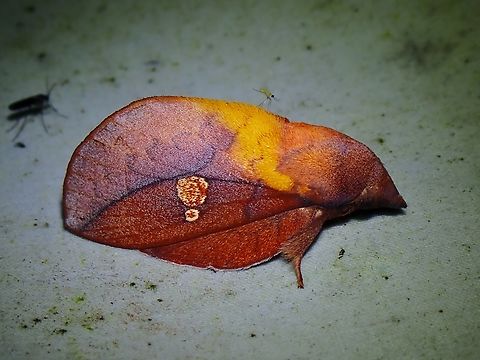
Appearance
Forewings are leaf like with an oblique postmedial yellow patch on the dorsal surface sometimes with a violet saturation. The caterpillar is known to feed on "Dalbergia" species. Adults are found from rainforest and coastal associations. Male has a wingspan of 33–55 mm and 50–70 mm in females. Female is much larger and more robust than the male. Antennae bipectinate in both sexes, whereas the female has shorter rami. Body color is bright lilac reddish. Subspecies "divisa" in Sri Lanka is much darker. Hindwings are lightly divided with darker zones.Body of the caterpillar is brown to ash gray. There are black and gray speckles dorsally. The white to yellow colored spots and streaks grouped to form a complete marble pattern. Mesothorax bears a dorso-median line of black setae. The caterpillar is known to feed on "Lespedeza" and "Dalbergia" species.
Naming
Five subspecies are recognized, along with new subspecies.Distribution
It is found in South Asian countries like India, Sri Lanka, Nepal, Pakistan and Bangladesh towards Russian Far East of China, Siberia, Japan, Korea to South East Asian Sundaland.References:
Some text fragments are auto parsed from Wikipedia.